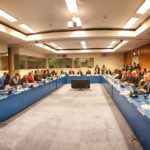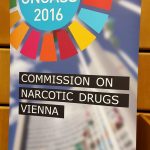(b) Challenges and future work of the Commission on Narcotic Drugs, the World Health Organization and the International Narcotics Control Board in the review of substances for possible scheduling recommendations (c) International Narcotics Control Board (d) International cooperation to ensure the availability of narcotic drugs and psychotropic substances for medical and scientific purposes while preventing …
Accion Tecnica y Social (ATS)
Side event: Criminalization and persecution vs. Health and development: The path forward
Organized by the International Drug Policy Consortium, Acción Técnica Social, Center of Studies for Law, Justice and Society, the Brazilian Drug Policy Platform, Fundación Friedrich Ebert en Colombia, Elementa, and Instituto RIA. Mariano Fusero (Remove term: RESET – Política de Drogas y Derechos Humanos): Since the end of the 90s to 2017 the prison population …
Item 11. Follow-up to the special session of the General Assembly on the world drug problem held in 2016, including the seven thematic areas of the outcome document of the special session (Afternoon session)
Indonesia: Nearly 3 years have passed since UNGASS – we have been committed to advancing promotion of human rights. In addressing the drug problems whilst protecting human rights the government has provided funding for therapy programmes for drug users and special needs populations such as women and children. It is important that human rights are …
Side event: The complexity of the drug problem and the need to update national legislation

Antonio De Leo, UNODC (Chair): The world drug problem is complex, we all know that. It requires a comprehensive approach to tackle its causes and consequences. The Ministerial Segment of CND is a good opportunity to review and evaluate how each country and region can adapt their own drug legislation and frameworks to realities. Implementing …
Side event: Scenarios for innovation: Regulating the coca/cocaine market
Zara Snapp, Acción Técnica Social: For the past 52/54 years, Colombia has been involved in a conflict. Point 4 of the Peace Agreement to end that conflict, is about eradicating [300,000 hectares]. The Government claims it has done half of this. But this is also about integrating people in the formal economy. This will have very …
CND Intersessional, 17 October 2017: Chapter 5 on evolving reality, trends and existing circumstances

Post-UNGASS Facilitator: I encourage the same level of active participation as we had yesterday, which was a good discussion. Please do ask questions of the panellists. On the panel today, we have the Colombian Ambassador, Angela Mae from UNODC, Gilles Fortes from WHO, Paul Griffiths from EMCDDA, and an NGO representative from the Golden Colombia Initiative. …